八年级下册英语Unit_4教案
八年级下册unit4教案

Unit 4 He said I was hard-working . Teaching goals:1. Vocabulary: hard-working ,report card ,can do better ,speaking,listening ,average ,surprise .2. Patterns: What did your math teacher say ?He said he could speak three languages .Important and difficult points :1. New words and expressions.2. How to write a report card.Teaching aids : teaching cards , pictures and a tape recorder .Period 1Teaching contents:SectionA 1a,1b,1c,2a,2b,2c,Grammar focus . Teaching procedures :Step 1 Leading inAsk several Ss what they are going to do after school .Write their sentences on the Bb .Step 2 Pre-taskSay, These Ss talk about what they are going to do after school ,if you want to tell a friend what they said ,how would you tell him ?Write the words “He said” and “She said” on the Bb .Say,We can use the words “He said” and “She said” to tell your friend like this :He/She said he/she was going to play basketball after school .Get the Ss to repeat . Repeat this process with the other sentences on the Bb .Step 3 While-taskSB Page 26 , 1a .1. Ask a student to read the four questions .2. point out the TV screens in the picture .Ask one student to read whatthe person says in the first picture .Then ask another student :Whatdid she/he say ? Help to answer :She/He said she/he was having asurprise party for Lana on Friday night .3. Repeat with the other pictures .SB Page 26 , 1c .Pairwork.First Ss work in pairs ,then ask some pairs to present their dialogues to the class .SB Page 26 , 1b .Play the recording and correct the answers .Step 4 Post-taskSB Page 27 , 2a & 2b .1. Ask several Ss to read these sentences .2. Play the recording .Ss circle their answer .3. Check the answers .Step 5 Grammar Focus1. Review the grammar box by ask Ss to say the statements .2. Explain: In each case ,the direct speech talks about present situationsand the reported speech talks about past situations .Step 6 HomeworkUse he \she said rewrite the sentences.1. I am a clever girl .2. I am having lunch at school .3. I can dance well .4. I play football every day .5. I don’t like my younger brother .。
新人教版八年级英语下册unit4全单元教案

2. Use the information in 1a to make other conversations.
3. Let some pairs act out their conversations.
e.g. A:What’s wrong?
Exercise:
Listen again. Fill in the blanks.
Boy 2 had a ______ with his best friend. He could ______ him a letter. But he isn’t good at writing letters. He ______ call him ____, but he doesn’t want to talk about it on the ______. He ______ talk tohim so that he can say he’s sorry but it’s not ____. He ______go to his house but he doesn’t want to _______ him. He could take him to the _____________, but he doesn’t want to wait that long.
Homework:
Write three conversations about your problems and your friends’ suggestions.
A: I have too many after-school classes.
What could I do?
人教版八年级英语下册unit4教案

Unit4Why don'tyou talk to your parents教材解读 本单元的中心话题是人际交往,与学生实际生活紧密相关,主要探讨当代中小学生 所面临的种种压力和困境,并针对这些问题给予合理的建议。通过学习本单元,学生应 能询问、陈述自己或他人的困难和麻烦,能针对别人的困境提出解决的办法和建议。语 法部分主要是关于学生能正确使用情态动词could,should表达建议或劝告,能正确使
1.big deal是英语中的一个固定搭配,表示“重要的事情或状况”,多用于非正式交流。作否定用法时,常说It's not a big dea或It's no big deal表示说话人并不认为某事有什
么了不起。
.①There's a soccer game on TV this evening but I don't have to watch it. It
二、过程与方法
采用直观教学法,情景教学法,小组讨论与交流来了解生活中、学习中常见的矛盾 与困难以及提出合理建议。
三、情感态度与价值观
培养学生良好的合作意识,鼓励学生大胆表达自己的想法和意愿。正确认识生活中 的一些困难,能采用正确的方式解决生活中的问题。
教学重点
掌握提建议的重点句型:You should/could…Why don 'tyou…
4I have too many after-school classes.
5I got into a fight with my best friend.
英语人教版八年级下册Unit 4 教学设计

Unit 4 Why don’t you talk to your parents? 教学设计一、教材分析(一)教材的地位和作用本课的中心话题是谈论同学们生活及学习中的问题和困难并提出合适的建议,从而展开教学活动。
学习本课的内容为整个单元打下基础,同时也是英语教学中拓展学生思维的重要环节。
(二)教学目标的确立和依据根据《新课程标准》的要求,为了完成正常的教学任务,有效地培养学生的自信,创新精神和合作互助的能力,我确立如下的教学目标:1、语言知识:学生能够使用以下词汇:too much, enough, allow, hang out, fight,wrong, midnight.句型:----What’s wrong?----I have to study too much so I don’t get enough sleep. ----Why don’t you talk to your parents?2、语言技能:(1)学完本课,让学生学会用英语说出学习和生活中的问题和困难,并能根据别人的问题给出合适的建议。
(2)能运用所学单词、短语及句型,结合实际生活进行灵活运用。
3、学习策略:(1)自主学习:要求学生采用自主学习的方式,能根据需要进行有目的的预习。
(2)合作学习:在活动中相互探讨,相互交流与合作,从而获得知识、技能和情感体验。
4、情感态度:(1)通过说出自己学习和生活中的问题和困难,让同学们学会释放压力,增加自信,热爱生活。
(2)通过给别人提建议,培养学生团结互助的精神,增进同学之间的感情。
5、文化意识:(1)了解中西方文化差异:我们比较委婉,而西方人则更直接一些,对学生进行不同文化意识的渗透。
(三)教学重点和难点:1.重点:让学生用英语说出学习和生活中的问题和困难,并且给出别人一些合适的建议,注意提建议的句型及用法和建议形式的多样化。
2.难点:用英语给出合适的建议是一大难点,词汇和短语搭配等基本功要扎实。
人教版英语八年级下册Unit4课教学设计
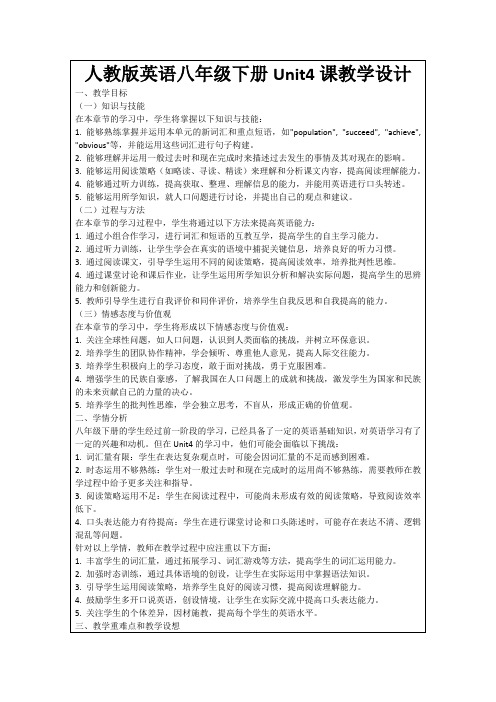
3.通过阅读课文,引导学生运用不同的阅读策略,提高阅读效率,培养批判性思维。
4.通过课堂讨论和课后作业,让学生运用所学知识分析和解决实际问题,提高学生的思辨能力和创新能力。
5.教师引导学生进行自我评价和同伴评价,培养学生自我反思和自我提高的能力。
2.利用例句和情景,引导学生学习一般过去时和现在完成时的用法,让学生在实际语境中感受这两种时态的区别和联系。
3.以课文为载体,教授阅读策略,如略读、寻读、精读等,帮助学生更好地理解课文内容。
4.对课文中的重点句子进行分析,让学生学会运用所学语法知识进行句子构建。
(三)学生小组讨论,500字
在学生小组讨论环节,我将组织以下活动:
2.语法练习:完成一般过去时和现在完成时的语法练习题,要求学生能够准确运用这两种时态描述过去的事情及其对现在的影响。
提示:学生可以通过写作或口头练习来巩固时态的运用。
3.阅读练习:阅读一篇关于人口问题的短文,运用课堂所学的阅读策略,如略读、寻读、精读,提高阅读理解能力。并回答相关问题。
提示:学生可以总结文章的主要观点,并用自己的话进行复述。
3.阅读策略运用不足:学生在阅读过程中,可能尚未形成有效的阅读策略,导致阅读效率低下。
4.口头表达能力有待提高:学生在进行课堂讨论和口头陈述时,可能存在表达不清、逻辑混乱等问题。
针对以上学情,教师在教学过程中应注重以下方面:
1.丰富学生的词汇量,通过拓展学习、词汇游戏等方法,提高学生的词汇运用能力。
6.家庭作业:要求家长参与,让学生向家长介绍本节课所学的知识,并讨论家庭所在地区的人口问题。
提示:家长可以提问,促进学生思考和表达,同时加强家校合作。
人教版初中八年级英语下册第四单元Unit 4 教案含教学反思

Section A 单词allow v.允许;准许wrong adj.有毛病;错误的guess v.猜测;估计deal n.协议;交易relation n.关系;联系;交往communication n.交流;沟通argue v.争吵;争论cloud n.云;云朵elder n.年纪较长的instead adv.代替;反而;却whatever pron.任何;每一nervous adj.焦虑的;担忧的offer v.主动提出;自愿给予proper adj.正确的;恰当的secondly adv.第二;其次communicate v.交流;沟通explain v.解释;说明clear adj.清楚易懂的;晴朗的copy v.抄袭;模仿;复制;复印return v.归还;回来;返回anymore adv.(常用于否定句和疑问句句末)再也(不);(不)再短语look through快速查看;浏览big deal重要的事work out成功地发展;解决get on with和睦相处;关系良好句型1.Many of them are learning exam skills so that they can get into a good high school and later a good university.他们中很多人正在学习应试技巧以便能考入一所好高中,进而升入一所好大学。
2.The Taylors are a typical American family.泰勒家就是一个典型的美国家庭。
3.And they are always comparing them with other children.而且她们总是将自己的孩子和别的孩子相比较。
语法although, so that及until引导的状语从句知识目标掌握课文中的重点词汇及相关短语,并灵活运用。
能力目标学会谈论问题和给出建议情感目标遇到问题要主动地去和家人、朋友或亲近的人交流;如果身边的人遇到问题,能主动提供帮助;要学会放松、缓解压力。
人教版八年级下册英语教案unit4
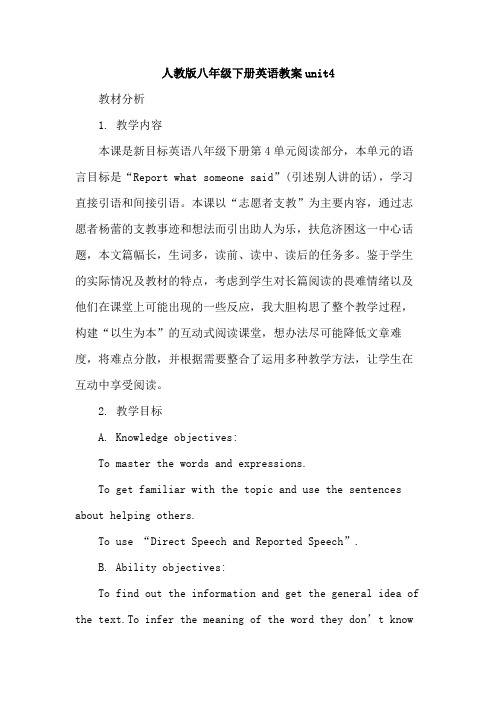
人教版八年级下册英语教案unit4教材分析1. 教学内容本课是新目标英语八年级下册第4单元阅读部分,本单元的语言目标是“Report what someone said”(引述别人讲的话),学习直接引语和间接引语。
本课以“志愿者支教”为主要内容,通过志愿者杨蕾的支教事迹和想法而引出助人为乐,扶危济困这一中心话题,本文篇幅长,生词多,读前、读中、读后的任务多。
鉴于学生的实际情况及教材的特点,考虑到学生对长篇阅读的畏难情绪以及他们在课堂上可能出现的一些反应,我大胆构思了整个教学过程,构建“以生为本”的互动式阅读课堂,想办法尽可能降低文章难度,将难点分散,并根据需要整合了运用多种教学方法,让学生在互动中享受阅读。
2. 教学目标A. Knowledge objectives:To master the words and expressions.To get familiar with the topic and use the sentences about helping others.To use “Direct Speech and Reported Speech”.B. Ability objectives:To find out the information and get the general idea of th e text.To infer the meaning of the word they don’t knowfrom the context.C. Affective objectives:Students are to realize the importance of helping others and they are encouraged to help others.Students’ team spirit will be improved by completing a certain task together.By understanding the life in rural areas, students are to realize how happy they are.3. 教学策略:(1)兴趣激发策略。
八年级下册英语unit 4大单元教学设计
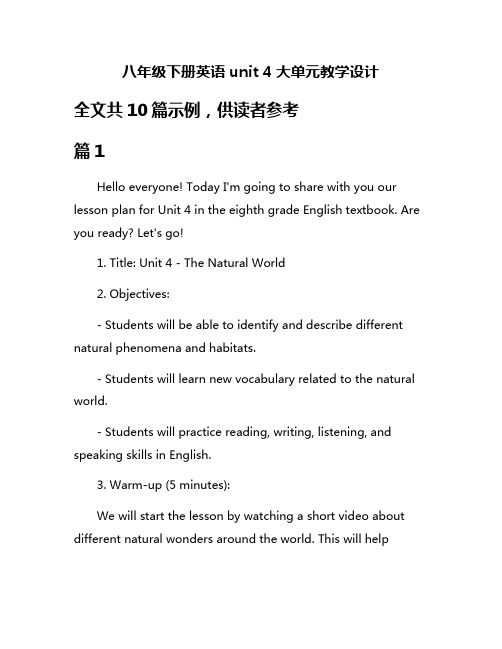
八年级下册英语unit 4大单元教学设计全文共10篇示例,供读者参考篇1Hello everyone! Today I'm going to share with you our lesson plan for Unit 4 in the eighth grade English textbook. Are you ready? Let's go!1. Title: Unit 4 - The Natural World2. Objectives:- Students will be able to identify and describe different natural phenomena and habitats.- Students will learn new vocabulary related to the natural world.- Students will practice reading, writing, listening, and speaking skills in English.3. Warm-up (5 minutes):We will start the lesson by watching a short video about different natural wonders around the world. This will helpstudents get excited about the topic and activate their prior knowledge.4. Vocabulary Building (15 minutes):We will introduce new vocabulary words related to the natural world, such as "ecosystem", "biodiversity", "conservation", etc. Students will work in pairs to match the words with their definitions and discuss examples of each concept.5. Reading Comprehension (20 minutes):Students will read a passage about the Amazon Rainforest and answer comprehension questions afterwards. This will help them practice their reading skills and learn more about one of the most diverse ecosystems in the world.6. Listening Exercise (15 minutes):We will listen to a recording of different animal sounds and ask students to identify each animal. This will help them improve their listening skills and learn more about the various habitats where these animals live.7. Speaking Activity (20 minutes):Students will work in groups to create a presentation about a specific natural phenomenon or habitat. They will have todescribe the location, climate, flora and fauna, and any conservation efforts in place. This will help them practice their speaking skills and work on their communication abilities.8. Writing Task (15 minutes):Students will write a short paragraph about their favorite natural wonder and why they find it fascinating. They will also have to use at least three new vocabulary words from the lesson. This will help them practice their writing skills and consolidate their knowledge of the new vocabulary.9. Review and Homework (5 minutes):We will review the key points of the lesson and assign homework, which will include reading a passage about a different natural habitat and answering comprehension questions.That's it for our lesson plan on Unit 4 - The Natural World! I hope you all enjoyed it and learned something new today. See you next time! Bye bye!篇2Hello everyone! Today I'm going to share with you the lesson plan for Unit 4 in the eighth grade English class. This unitis all about famous people and their achievements, so let's get started!First, we will start off by introducing the topic of the unit with a short video or a fun activity to get students interested. We can talk about different famous people from history or present day and what they are known for.Next, we will move on to the vocabulary and grammar lessons. We can introduce new words related to the topic such as "inventor", "scientist", "composer" and so on. We can also review grammar points like past simple tense, comparatives and superlatives to talk about the achievements of these famous people.After that, we can have a reading comprehension activity where students read a short passage about a famous person and answer questions to test their understanding. This will help them practice their reading skills and learn more about different individuals who have made an impact on the world.For the speaking and listening activities, we can have group discussions or role plays where students pretend to be a famous person and talk about their accomplishments. This will help them practice speaking and listening skills in a fun and interactive way.Finally, we can end the lesson with a creative project where students can choose a famous person to research and present to the class. They can create a poster, a PowerPoint presentation or even a short skit to showcase what they have learned.I hope you all enjoy this lesson plan for Unit 4 and have fun learning about famous people and their achievements. Let's make this unit a memorable one!篇3Hello everyone! Today I'm going to share with you the teaching plan for Unit 4 in the eighth grade English textbook. This unit is all about technology, and we have lots of fun activities planned to help you learn.First, we will start off with a warm-up activity to get us thinking about technology. We will watch a short video about the history of computers and discuss it as a class. This will help us understand how far technology has come and how it has changed our lives.Next, we will move on to the vocabulary section. We will learn new words related to technology, such as "smartphone," "tablet," and "internet." We will practice using these words in sentences and have a vocabulary quiz at the end of the week.After that, we will move on to grammar. In this unit, we will focus on the present perfect tense. We will learn how to form the present perfect, when to use it, and practice using it in our speaking and writing.In the reading section, we will read an article about the future of technology. We will discuss the predictions made in the article and talk about how these advancements could change our lives in the future.For the speaking activity, we will work in pairs to discuss the pros and cons of technology. We will practice expressing our opinions and listening to others' viewpoints.In the writing section, we will write a short paragraph about our own experiences with technology. We will talk about our favorite gadgets, how technology has helped us in our daily lives, and any concerns we have about the impact of technology on society.At the end of the unit, we will have a technology fair where you can showcase a project related to technology. This could be a presentation, a poster, or even a short skit. This will be a fun way to demonstrate what you have learned and show off your creativity.I hope you are excited for Unit 4 and ready to learn all about technology. Let's have a great time exploring the world of tech together!篇4Hello everyone! Today I'm going to share with you my teaching plan for the 8th Grade Unit 4 in English class. This unit is all about travel and destinations, so it's going to be super fun and exciting!First, we will start with a warm-up activity to get everyone excited about the topic. We can play a game called "Destination Race" where students have to answer questions about different countries and their famous landmarks. It will be a great way to test their knowledge and get them thinking about different places around the world.Next, we will move on to the main lesson where we will learn vocabulary words related to travel and destinations. We can use flashcards, pictures, and even role-playing activities to help students understand and remember the new words. For example, we can pretend to be tourists at a famous landmark and practice asking for directions in English.After that, we will work on grammar and sentence structures related to travel. We can do exercises on using prepositions of place, past tense verbs for talking about past trips, and using question words for asking about travel plans. It will be important for students to practice using the correct grammar when talking about their own travel experiences.To wrap up the lesson, we can have a group discussion where students can share their dream travel destinations and why they want to visit them. It will be a great way for students to practice speaking in English and expressing their opinions in a fun and engaging way.Overall, I'm really excited to teach this unit and I know it's going to be a great learning experience for everyone. I can't wait to see all the amazing places we will explore together! Let's get ready for an adventure in English class!篇5Hello everyone! Today I want to share with you my exciting lesson plan for Unit 4 of the eighth grade English textbook. This unit focuses on the theme of "Healthy Living", and we will be learning all about how to stay healthy and fit.To start off the lesson, I will introduce the topic of healthy living by discussing why it is important to eat well and exercise regularly. We will have a class discussion about the benefits of a healthy lifestyle and share our own experiences with staying healthy.Next, we will dive into the vocabulary and grammar of the unit. I will introduce new words related to health and fitness, such as "nutrition", "exercise", and "balanced diet". We will also practice using these words in sentences and conversations to help reinforce our understanding.After that, we will move on to the reading and writing activities in the textbook. We will read a passage about different ways to stay healthy, and discuss the main ideas and key points. Then, we will work on writing our own tips for healthy living, using the vocabulary and grammar we have learned.To wrap up the lesson, we will play some fun games and activities to review the material we have covered. We might do a health and fitness quiz, a role-playing activity about making healthy choices, or even a mini workout session to get our bodies moving!I hope you are all excited for this unit on healthy living. Let's work hard and have fun learning together! Remember, a healthybody leads to a healthy mind. Let's do our best to stay fit and happy!篇6Hello everyone, I am going to share with you the teaching plan for Unit 4 of the eighth grade English textbook.First, we will start with the warm-up activity. We can play a game called "Word Chain" where students have to think of a word related to the previous one given by the teacher. This will help activate students' prior knowledge and get them engaged in the lesson.Next, we will move on to the vocabulary section. We can introduce new words by showing pictures and asking students to guess the meaning. Then, we can play a matching game where they have to match the word with its definition. This will help students remember the new vocabulary better.After that, we will focus on the grammar points of the unit. We can teach them the present perfect tense using real-life examples. For example, we can ask students if they have ever been to a foreign country and they can make sentences using the present perfect tense.Following the grammar portion, we can move on to the reading comprehension section. We can choose a passage related to the topic of the unit and ask students to read it silently. Then, we can ask comprehension questions to check their understanding. This will also help improve their reading skills.For the writing practice, we can ask students to write a short paragraph about their own experiences using the present perfect tense. This will give them an opportunity to apply what they have learned in a creative way.Finally, we can end the lesson with a group discussion where students can share their paragraphs with their classmates. This will promote speaking and listening skills as well as encourage peer interaction.In conclusion, this teaching plan aims to help students learn the content of Unit 4 in a fun and interactive way. By incorporating various activities such as games, matching exercises, reading comprehension, and writing practice, we can ensure that students are actively engaged and motivated to learn. Let's have a great lesson together!篇7Hello everyone! Today I'm going to share with you the teaching plan for Unit 4 in the eighth grade English textbook. This unit is all about "Science and Technology", and we are going to have so much fun learning new words and ideas together.First, we will start by introducing the vocabulary related to science and technology. We will learn words like "experiment", "invention", and "innovation". We will also talk about famous scientists and their discoveries, such as Isaac Newton and Albert Einstein.Next, we will move on to grammar and sentence structure. We will practice using the present perfect tense to talk about past experiences and achievements. For example, "I have never seen a shooting star before" or "She has invented a new gadget".After that, we will focus on reading and comprehension. We will read articles about the latest technological advancements and discuss their impact on society. We will also do some reading exercises to improve our reading skills.In the speaking and listening activities, we will practice having conversations about science and technology. We will work in pairs or groups to discuss topics like space exploration, artificial intelligence, and climate change. It will be a great opportunity to improve our communication skills.Finally, we will end the unit with a project presentation. Each student will choose a topic related to science and technology and prepare a presentation to share with the class. This will be a chance for us to showcase our knowledge and creativity.I hope you are all excited about learning and exploring the world of science and technology in Unit 4. Let's have a great time together and make some amazing discoveries! Thank you for listening and let's get started!篇8Unit 4 in our eighth-grade English textbook is all about exploring different cultures and traditions around the world. In this unit, we will learn about different countries, their customs, food, music, and holidays. It's going to be super interesting and fun!To start off the unit, our teacher will introduce us to the concept of culture and why it's important to learn about different cultures. We will talk about the differences and similarities between cultures and how we can appreciate and respect diversity.Next, we will dive into specific countries and their traditions. We will learn about famous landmarks in different countries, trytraditional foods, and even listen to some music from around the world. It's going to be like a mini world tour right in our classroom!One of the highlights of this unit is going to be learning about festivals and holidays from different cultures. We will explore celebrations like Diwali in India, Chinese New Year in China, and Day of the Dead in Mexico. We might even get to participate in some fun activities related to these festivals.Throughout the unit, we will have interactive activities, group projects, and even presentations to showcase what we have learned. We will also have quizzes and games to test our knowledge and make learning even more exciting.By the end of this unit, we will have a better understanding and appreciation of different cultures around the world. We will have learned how to embrace diversity, respect traditions, and celebrate differences. It's going to be an amazing journey of discovery and learning for all of us!So get ready, class, for an adventure like no other as we set out to explore the wonderful world of cultures and traditions in Unit 4 of our eighth-grade English class. Let's make this journey together and have a blast learning about the rich tapestry of our world!篇9Unit 4 in our eighth-grade English textbook is super exciting! In this unit, we will be focusing on different aspects of society and social issues. We will learn about different cultures, human rights, and environmental problems. It's going to be so much fun!To kick off the unit, we will start by discussing cultural differences and similarities. We will talk about different customs, traditions, and beliefs from around the world. We will also learn how to respect and appreciate diversity in society.Next, we will dive into the topic of human rights. We will learn about the Universal Declaration of Human Rights and discuss the importance of treating every individual with dignity and respect. We will also explore different human rights issues that people face in society today.After that, we will shift our focus to environmental problems. We will learn about the impact of pollution, deforestation, and climate change on our planet. We will also discuss ways in which we can help protect the environment and make a positive impact on the world.Throughout the unit, we will engage in various activities such as group discussions, debates, and presentations. We will also work on improving our reading, writing, listening, and speaking skills through a variety of exercises and assignments.I am so excited to learn about these important topics and I can't wait to share my opinions and ideas with my classmates. I know that by the end of this unit, I will have a better understanding of society and be more aware of the world around me. Let's make Unit 4 the best one yet!篇10Hello everyone! Today I'm going to share with you the teaching plan for Unit 4 in the eighth grade English textbook.First, let's start with the goals of this unit. By the end of this unit, students should be able to:1. Understand and use vocabulary related to sports and leisure activities.2. Describe their favorite sports and hobbies.3. Talk about past experiences and future plans.4. Write a short paragraph about their leisure activities and preferences.Now, let's move on to the activities for this unit:1. Warm-up: To start the lesson, we can do a quick review of the vocabulary from the previous units related to sports and hobbies. We can also show some pictures of different sports and leisure activities and ask students to guess the names.2. Vocabulary building: Introduce new vocabulary related to sports and hobbies through a matching game or a flashcard activity. Encourage students to use the new words in sentences to practice their speaking skills.3. Listening practice: Play an audio recording of people talking about their favorite sports and hobbies. Ask students to listen carefully and answer questions about the speakers' preferences.4. Speaking practice: Divide students into pairs or small groups and have them talk about their own favorite sports and hobbies. Encourage them to ask questions to each other to practice their conversation skills.5. Writing activity: Ask students to write a short paragraph about their leisure activities and preferences. Provide them with sentence starters and vocabulary to help them compose their paragraphs.In conclusion, this unit aims to improve students' vocabulary, speaking, listening, and writing skills in English. I hope this teaching plan will help you in preparing for your lessons. Let's have fun learning together!。
人教版八年级下册英语unit4教案及教学反思

人教版八年级下册英语unit4教案及教学反思全文共3篇示例,供读者参考篇1Unit 4 of the People's Education Press Eighth Grade English textbook is focused on the theme of "Hobbies". This unit aims to help students talk about their own hobbies and interests, as well as learn how to express preferences and opinions.Teaching Objectives:1. Enable students to talk about their hobbies and interests in English.2. Introduce vocabulary related to different hobbies.3. Teach students how to express preferences and opinions.4. Improve students' listening, speaking, reading, and writing skills.Teaching Procedures:1. Warm-up activity: Start the lesson by asking students to share their hobbies with the class. This will help to activate their prior knowledge and create a positive learning atmosphere.2. Vocabulary introduction: Introduce key vocabulary related to hobbies, such as "painting", "cooking", "playing sports", etc. Use pictures, gestures, and realia to help students understand and remember the new words.3. Listening comprehension: Play a listening passage where people talk about their hobbies. Students listen and then answer comprehension questions to check their understanding.4. Speaking practice: Divide the class into pairs or groups and ask them to discuss their own hobbies, using the vocabulary they have learned. Encourage students to ask questions and share their opinions with each other.5. Reading activity: Give students a reading passage about different hobbies and ask them to identify key information, such as the benefits of each hobby and how to get started.6. Writing task: Ask students to write a short paragraph about their favorite hobby, describing why they enjoy it and how it makes them feel. Provide feedback on their writing to help improve their language skills.7. Role-play activity: Divide students into pairs and give them a role-play scenario where they discuss their preferencesfor different hobbies. This will help them practice expressing opinions and using the target vocabulary.8. Review and assessment: End the lesson with a review of key vocabulary and concepts covered in the unit. Administer a quiz or speaking activity to assess students' understanding and progress.Teaching Reflection:Overall, teaching Unit 4 on Hobbies was engaging and effective. The activities helped students practice speaking, listening, reading, and writing skills in a fun and interactive way. However, one area for improvement is to provide more opportunities for students to use the target language in real-life contexts. For example, incorporating project-based learning tasks where students create a hobby-themed presentation or video could further enhance their language proficiency.In conclusion, Unit 4 provided a valuable opportunity for students to explore their interests and hobbies in English. By incorporating a variety of activities and assessments, teachers can help students achieve the learning objectives and improve their English language skills.篇2Unit 4 of the People's Education Edition eighth grade English textbook covers the topic of "Wild Animals". In this unit, students will learn vocabulary related to wild animals, practice reading and listening skills through various texts, and improve their ability to describe animals and discuss their habitats.Lesson 1:- Warm-up: Start the lesson by asking students to name different wild animals they know.- Vocabulary: Introduce new vocabulary words related to wild animals such as lion, elephant, tiger, etc.- Reading: Read a short passage about different wild animals and ask students comprehension questions.- Listening: Play a recording of different animal sounds and ask students to match the sound with the correct animal.- Speaking: Have students describe their favorite wild animal and why they like it.Lesson 2:- Warm-up: Review the vocabulary words from the previous lesson by playing a matching game.- Reading: Read a longer passage about a safari trip and ask students to identify the animals mentioned in the text.- Grammar: Introduce comparatives and superlatives using examples related to wild animals (e.g. The elephant is bigger than the giraffe).- Speaking: Have students work in pairs to discuss which animal they think is the most interesting and why.Lesson 3:- Warm-up: Play a game of charades where students act out different wild animals for their classmates to guess.- Reading: Read a passage about endangered animals and discuss why it is important to protect them.- Writing: Have students write a short paragraph about what they can do to help protect endangered animals.- Speaking: Conduct a class debate on whether or not zoos are good for wild animals.Lesson 4:- Warm-up: Review the vocabulary and grammar concepts learned in the previous lessons through a quiz.- Project: Have students work in groups to create a poster about a specific wild animal, including information about its habitat, diet, and interesting facts.- Presentation: Have each group present their poster to the class and answer questions from their classmates.Teaching Reflection:Overall, the unit was engaging and interactive for students. The variety of activities helped to keep students interested and motivated throughout the lessons. The vocabulary and grammar concepts were presented in a clear and concise manner, allowing students to grasp the new material easily. The project at the end of the unit provided students with an opportunity to apply what they had learned and showcase their creativity. However, I would like to incorporate more opportunities for students to practice speaking and listening skills in future lessons to further develop their language proficiency.篇3Unit 4 of the eighth-grade textbook by People's Education Press focuses on the theme of "Wild animals". In this unit, students will learn about various wild animals and their habitats, as well as the importance of wildlife conservation.The unit is divided into several sections, including reading, listening, speaking, and writing tasks. The reading passages describe different wild animals such as lions, elephants, and pandas, providing students with essential information about these creatures. The listening activities help students improve their listening skills by practicing comprehension and understanding spoken English. Speaking tasks encourage students to express their opinions and share information about wild animals with their peers. Writing tasks require students to write short paragraphs or essays about their favorite kind of wild animal or the importance of wildlife conservation.To begin the unit, teachers can introduce the topic of wild animals by showing pictures or videos of different types of wildlife. This can generate interest and curiosity among students, prompting them to learn more about these fascinating creatures. Teachers can also engage students in group discussions or debates about wildlife conservation and the impact of human activities on the environment.During the reading and listening activities, teachers should provide support and guidance to students as they work through the text and audio materials. Encouraging students to ask questions, make predictions, and summarize key points can helpthem better comprehend the information presented. Teachers can also incorporate vocabulary-building exercises, such as word matching or crossword puzzles, to reinforce new words and concepts.For the speaking and writing tasks, teachers can encourage students to use creative expression and critical thinking skills. Providing opportunities for role-playing, storytelling, and collaborative writing can enhance students' language abilities and boost their confidence in using English. Teachers can also assign group projects or presentations that require students to research and present information about specific wild animals or conservation efforts.In conclusion, Unit 4 of the eighth-grade textbook by People's Education Press offers a comprehensive and engaging exploration of wild animals and wildlife conservation. By incorporating a variety of teaching strategies and activities, teachers can facilitate students' learning and language development in a meaningful and enjoyable way. Through active participation and interaction, students can deepen their understanding of the natural world and cultivate a sense of responsibility towards protecting our environment and its inhabitants.。
初中英语八年级Unit 4教学设计和反思
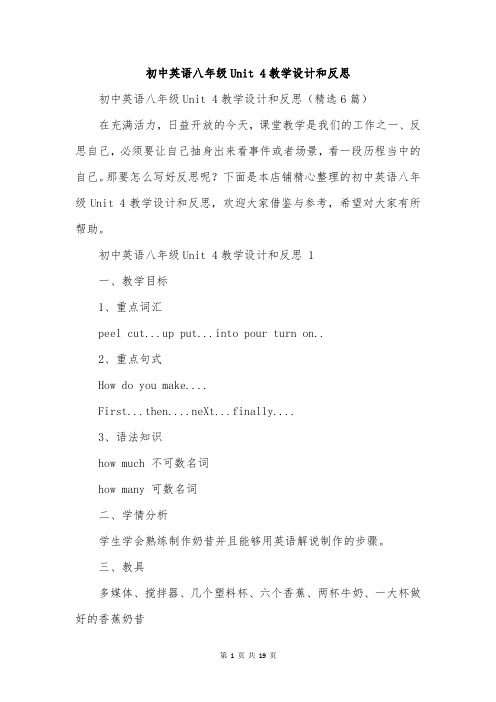
初中英语八年级Unit 4教学设计和反思初中英语八年级Unit 4教学设计和反思(精选6篇)在充满活力,日益开放的今天,课堂教学是我们的工作之一、反思自己,必须要让自己抽身出来看事件或者场景,看一段历程当中的自己。
那要怎么写好反思呢?下面是本店铺精心整理的初中英语八年级Unit 4教学设计和反思,欢迎大家借鉴与参考,希望对大家有所帮助。
初中英语八年级Unit 4教学设计和反思 1一、教学目标1、重点词汇peel cut...up put...into pour turn on..2、重点句式How do you make....First...then....neXt...finally....3、语法知识how much 不可数名词how many 可数名词二、学情分析学生学会熟练制作奶昔并且能够用英语解说制作的步骤。
三、教具多媒体、搅拌器、几个塑料杯、六个香蕉、两杯牛奶、一大杯做好的香蕉奶昔四、教学过程(一)导入课堂先微笑询问全班同学What drink do you like?待学生纷纷表达自己喜好时举着备好的奶昔边说Here is some banana milk shake.Would you like some....?学生抢着回答yes时把准备好的奶昔分给他们部分学生自带有杯子品尝。
之后问Do you know how to make this milk shake?有学生回答no并宣布现在我们来制作这种香蕉奶昔。
(二)教学make a banana milk shake1、播放图片。
让学生观看并说出制作奶昔所需工具和物品必要教师时帮助补充。
顺势学习搅拌器biender这个单词。
2、播放制作香蕉奶昔全过程。
结合学习关键词汇peel、cut...up、put ...into、pour、turn on....3、listening.要求学生把制作香蕉奶昔的顺序标在书本1b的横线上。
4、教师制作奶昔。
人教版英语八年级下册教案:Unit4 Why don’t you talk to your pare

Unit4 SectionA〔1a-2d〕教案1.0Teaching Analysis教情分析1.1Teaching Objectives 教学目的1.1.1Language goals 语言目的allow, wrong, guess, deal, allow sb.to do sth., get into a fight with, be angry with, work out, call sb. up, surprise sb., give sth. back, be good at, although, hang out with, have a fight with, wait that long, talk about1) What’s the matter? P252) What’s wrong? P253) My parents don’t allow me to hang out with my friends. P254) I got into a fight with my best friend? P255) You should call him up. P266) I don’t want to talk about it on the phone. P267) What should I do? P268) But why don’t you forget about it so that you can be friends again? P269) Hope things work out. P2610) I guess you could tell her to say sorry. P2611) I found my sister looking through my things yesterday. P261) I have to study too much so I don’t get enough sleep. P26 (so 作连词,意为“因此,所以〞,表示因果关系。
人教版八年级英语下册Unit4 写作课教学设计(公开课教案)

Unit4 Why don’t you talk to your parents.写作课教学设计Teaching aims:Knowledge aims:Students could get familiar with after-school class and can express their opinions about it.Ability aims:Students will improve their writing and speaking abilities.Students will be able to collect writing materials and organize them according to one point.Emotional aims:Learning this lesson, students will know how to express their opinions logically.Students will learn to consider problems objectively and rationally.Teaching key points and difficult points:Key points:Students can make notes while discussion and arrange their arguments.Difficult Points:Students will learn to consider problems objectively and rationally.Teaching procedures:Step 1 Lead-in1.Greet students.2.Ask students questions “After school, what activities do you usually do?” and show some pictures about activities such as play basketball, play the piano and paint. Students will respond this question actively. In this way, I will lead to today’s topic “ your opinion on after-school classes for children”.(Justification: The question is closely related with the current situation of them and they would actively give answers. The teacher can lead the topic very naturally and it can also arouse students’ interest.)Step 2 Pre-writing1.Debate: Divide students into 2 groups and have a debate about “Your opinions on after-school class for children” One opinion is children should have after-school class because…/ The other opinion is children should not have after-school class because…. While the debate, the teacher will remind students to make notes of the reasons and then conclude the two opinions with students.eful expressions: ask students to pay attention to some conjunction words, such as firstly, then, in a word. And some sentence structures: I don’t really agree with... because...3.Outlining: Ask students to read 3b in the book, and illustrate the formation of letter.(Justification: through debating, students will have the material to write the letter. Through expression learning, the letter will be more logically. This part will lay a foundation for the following writing steps.) Step 3 While-writingDrafting: Ask students write a letter to the magazine to express their expressions on after-school class for children. Give students 15 minutes to write a draft.(Justification: Through writing by themselves, students’ writing ability will be improved.)Step 4 Post-writing1. Peer editing: After the drafting, ask students to check their articles with desk mates. They should read the passage and check the ideas or the logical development. Also, check carefully the grammar, spelling and punctuation of their writings.2. Ask several students to read their passages and then give someevaluations from the advantages and disadvantages.Then ask students to revise their articles according to the evaluations(Justification: The peer editing will help them find the mistakes about spelling , the grammar and the logic, which is a way to learn by themselves. They also learn the advantages and disadvantages from others. ) Step 5 Summary and homeworkSummary:Ask students to act as an assistant teacher to conclude what we have learned this class. And then the teacher will make some supplements.Homework:Do an interview: Ask your family members about their expressions on after-school class for children. And tell your parents your opinions about after-school class.Blackboard design:Expressions on after-school classDear XX,Children should have after-school class/ Children should not haveafter-school classFirstly,Then,In a word,Yours,XXX。
人教版英语八年级下册Unit4SectionB教学设计

5.在情感态度与价值观方面,八年级学生正处于青春期,具有较强的好奇心和求知欲,容易接受新鲜事物,但也容易受到不良价值观的影响。因此,教师应在教学中注重引导,培养学生正确的价值观和人生观。
2.时态的正确使用:一般现在时和一般过去时的运用是本节课的语法重点,学生需学会在实际语境中正确切换使用。
3.频率副词的运用:学生需要理解频率副词的含义,并能将其运用到句子中,描述日常活动的频率。
4.阅读理解的提高:通过阅读文章,培养学生获取关键信息、概括文章主旨的能力。
(二)教学设想
1.采用任务型教学法,设计丰富多样的课堂活动,让学生在实践中学习和掌握知识。
3.引导学生运用思维导图、列表等方法进行词汇和语法的学习,提高学习效果。
4.设计丰富的课堂活动,如讨论、采访、报告等,让学生在实践中掌握所学知识。
5.注重阅读策略的培养,引导学生运用略读、寻读等技巧,提高阅读效率。
(三)情感态度与价值观
本章节的教学目标还包括培养学生的情感态度和价值观:
1.激发学生对英语学习的兴趣,树立自信心,养成良好的学习习惯。
(五)总结归纳
1.教师与学生一起回顾本节课所学的内容,包括词汇、语法、句型等,并让学生用自己的话进行总结。
2.教师强调参加课外活动的重要性,引导学生树立正确的价值观,平衡学习与生活。
3.教师布置课后作业,要求学生运用所学知识编写一段关于自己课外活动的对话,并进行分享。
4.教师鼓励学生在课后积极参加课外活动,锻炼自己的能力,发展个人兴趣。
2.鼓励学生积极参与课外活动,发展个人兴趣和特长。
3.培养学生的团队协作精神,让他们学会与他人共同完成任务。
人教版八下英语Unit4全单元教案(经典建议收藏)
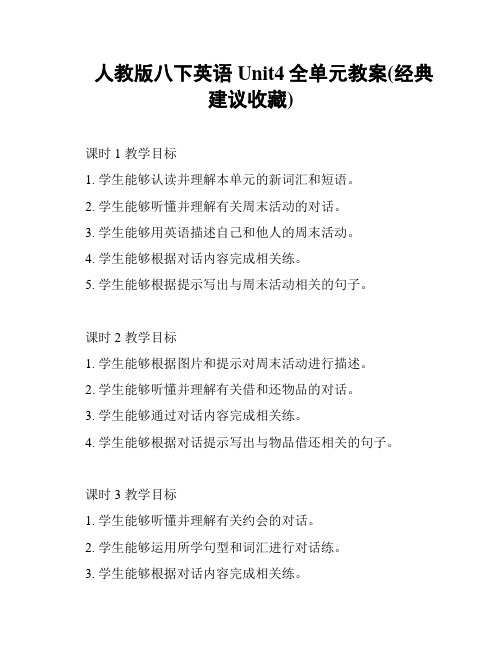
人教版八下英语Unit4全单元教案(经典建议收藏)课时1 教学目标1. 学生能够认读并理解本单元的新词汇和短语。
2. 学生能够听懂并理解有关周末活动的对话。
3. 学生能够用英语描述自己和他人的周末活动。
4. 学生能够根据对话内容完成相关练。
5. 学生能够根据提示写出与周末活动相关的句子。
课时2 教学目标1. 学生能够根据图片和提示对周末活动进行描述。
2. 学生能够听懂并理解有关借和还物品的对话。
3. 学生能够通过对话内容完成相关练。
4. 学生能够根据对话提示写出与物品借还相关的句子。
课时3 教学目标1. 学生能够听懂并理解有关约会的对话。
2. 学生能够运用所学句型和词汇进行对话练。
3. 学生能够根据对话内容完成相关练。
4. 学生能够用英语描述自己的约会经历。
5. 学生能够根据提示写出与约会相关的句子。
课时4 教学目标1. 学生能够听懂并理解有关邀请的对话。
2. 学生能够根据对话内容完成相关练。
3. 学生能够根据提示写出与邀请相关的句子。
课时5 教学目标1. 学生能够听懂并理解一篇有关暑假计划的短文。
2. 学生能够运用所学句型和词汇进行短文理解和书面表达练。
3. 学生能够根据短文内容完成相关练。
4. 学生能够用英语描述自己的暑假计划。
5. 学生能够根据提示写出与暑假计划相关的句子。
课时6 教学目标1. 学生能够运用词汇和句型描述日常生活中的活动。
2. 学生能够运用所学句型和词汇进行对话练。
3. 学生能够根据对话内容完成相关练。
4. 学生能够根据提示写出与日常活动相关的句子。
课时7 教学目标1. 学生能够听懂并理解有关节日庆祝的对话。
2. 学生能够用英语描述自己喜欢的节日。
3. 学生能够运用所学句型和词汇进行对话练。
4. 学生能够根据对话内容完成相关练。
5. 学生能够根据提示写出与节日庆祝相关的句子。
课时8 教学目标1. 学生能够听懂并理解有关健康惯的对话。
2. 学生能够根据对话内容完成相关练。
3. 学生能够用英语描述自己和他人的健康惯。
八年级英语下册《Unit 4 A good read Reading Gulliver in Lilliput》教案
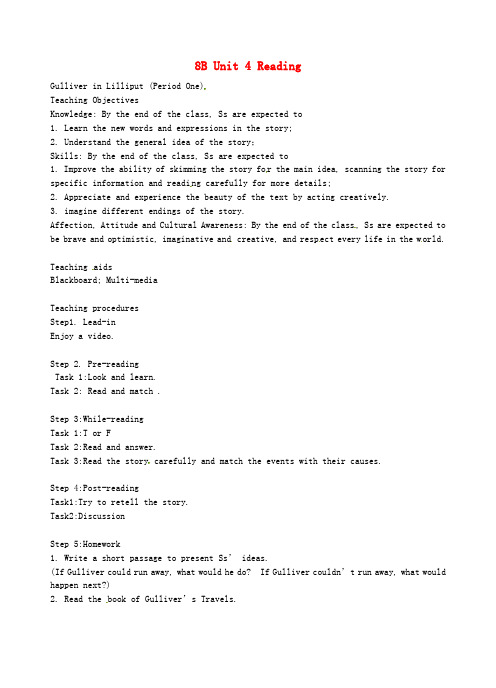
8B Unit 4 ReadingGulliver in Lilliput (Period One)Teaching ObjectivesKnowledge: By the end of the class, Ss are expected to1. Learn the new words and expressions in the story;2. Understand the general idea of the story;Skills: By the end of the class, Ss are expected to1. Improve the ability of skimming the story fo r the main idea, scanning the story for specific information and readi ng carefully for more details;2. Appreciate and experience the beauty of the text by acting creatively.3. imagine different endings of the story.Affection, Attitude and Cultural Awareness: By the end of the class, Ss are expected to be brave and optimistic, imaginative and creative, and resp ect every life in the w orld.Teaching aidsBlackboard; Multi-mediaTeaching proceduresStep1. Lead-inEnjoy a video.Step 2. Pre-readingTask 1:Look and learn.Task 2: Read and match .Step 3:While-readingTask 1:T or FTask 2:Read and answer.Task 3:Read the story carefully and match the events with their causes.Step 4:Post-readingTask1:Try to retell the story.Task2:DiscussionStep 5:Homework1. Write a short passage to present Ss’ ideas.(If Gulliver could run away, what would he do? If Gulliver couldn’t run away, what would happen next?)2. Read the book of Gulliver’s Travels.。
人教版英语八下UNIT4教案

人教版英语八下U N I T4教案(总19页)--本页仅作为文档封面,使用时请直接删除即可----内页可以根据需求调整合适字体及大小--Unit 4 Why don’t you talk to your parents?Section A【知识导入】have to study too much so I don’t get enough sleep.(P25)(1) have to 句型: have to “必须,不得不做某事”,与must 相比更有一种“被迫的”意思,后接动词原形。
Example: I have to clean my room. (可能是妈妈要求我必须去清理,而我自己还并没有想去)I must clean my room.(是我自己认为必须要清理一下房间了)(2)too much 表示“太多”可以跟在动词后面,例如:work too much ,eat too much (这是too much 是作为一个副词修饰前面的动词)或者后面接不可数名词,例如:too much homework,too much money (这里too much 是作为一个形容词来修饰后面的不可数名词)Too much 在口语中也可以表示“太过分了,太不像话了”(3)Enough 表示“足够的,足够地,很多,充足”Enough 当作为副词时,要跟在动词或者形容词后面,例如:good enough,sleep enough;当作为形容词时,后面可以接名词,例如:enough water,enough time。
Enough!在口语中表示“够了”,通常是带有情绪的表达。
有少数情况下,enough可以作为名词,当后面跟的是个代词时,要加of,例如:We have had enough of you! 我已经受够你了。
parents don’t allow me to hang out with my friends.(P25)(1)allow sb to do 表示“允许某人去做某事”类似用法:permit sb to do sth 允许某人去做某事;agree ab to do ath 同意某人去做某事tell sb to do sth 告诉某人做某事;refuse to do sth 拒绝做某事(2) hang out当为hang sth out 时是表示挂出,例如:I want to hang my clothes out.我想把我的衣服挂到外面去。
Unit4Task教案牛津译林版英语八年级下册
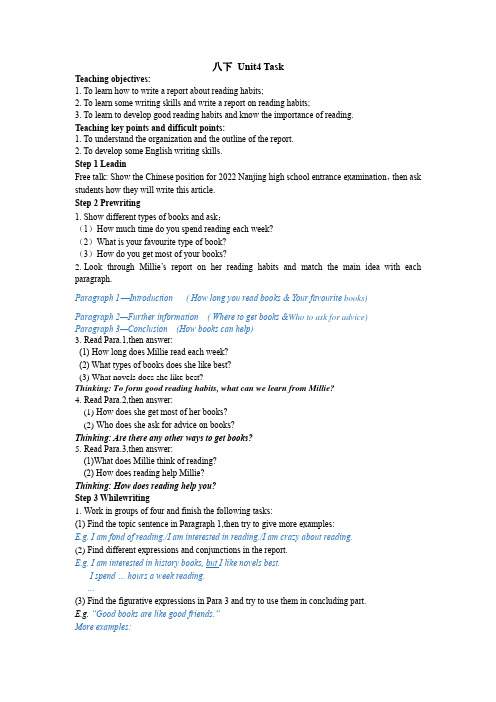
八下Unit4 TaskTeaching objectives:1. To learn how to write a report about reading habits;2. To learn some writing skills and write a report on reading habits;3. To learn to develop good reading habits and know the importance of reading.Teaching key points and difficult points:1. To understand the organization and the outline of the report.2. To develop some English writing skills.Step 1 LeadinFree talk: Show the Chinese position for 2022 Nanjing high school entrance examination,then ask students how they will write this article.Step 2 Prewriting1. Show different types of books and ask:(1)How much time do you spend reading each week?(2)What is your favourite type of book?(3)How do you get most of your books?2.Look through Millie’s report on her reading habits and match the main idea with each paragraph.Paragraph 1—Introduction ( How long you read books & Your favourite books)Paragraph 2—Further information ( Where to get books &Who to ask for advice)Paragraph 3—Conclusion (How books can help)3.Read Para.1,then answer:(1) How long does Millie read each week?(2) What types of books does she like best?(3) What novels does she like best?Thinking: To form good reading habits, what can we learn from Millie?4.Read Para.2,then answer:(1)How does she get most of her books?(2)Who does she ask for advice on books?Thinking: Are there any other ways to get books?5.Read Para.3,then answer:(1)What does Millie think of reading?(2) How does reading help Millie?Thinking: How does reading help you?Step 3 Whilewriting1.Work in groups of four and finish the following tasks:(1) Find the topic sentence in Paragraph 1,then try to give more examples:E.g. I am fond of reading./I am interested in reading./I am crazy about reading.(2)Find different expressions and conjunctions in the report.E.g. I am interested in history books, but I like novels best.I spend … hours a week reading....(3) Find the figurative expressions in Para 3 and try to use them in concluding part.E.g. “Good books are like good friends.”More examples:“Reading a good book is like talking to a noble man.”“ A good book is like a ship,leading us from narrow overflow to an indefinite ocean.”2.Work in pairs: Finish a survey on reading habits on P60 and make up a dialogue about your reading habits.3.Work in groups of four: Now you’ve been invited to the 2022 Jiangsu Book Fair (Nanjing Yuhuatai District). Write a report on your reading habits and share with others. And try to give some advice on developing good reading habits.S1: Introduction ( You personal information & How long you read books & Your favourite books) S2: Further information ( Where to get books &Who to ask for advice)S3: Importance (How books can help)S4: Advice (How to develop good reading habits)4. Choose 12 groups to show their reports and ask other students to give some suggestions. Help Ss polish their writings.Step4 Postwriting1.Show some researches on teenager reading in China and America.2.Watch a video: The importance of reading Professor Zhen. Then ask Ss to think about why it is important for us to develop good reading habits.Step 5 Summary1.Conclude how to write a report on good reading habits.2.Conclude the importance of reading.3.Enjoy reading! Enjoy life.Step 6 HomeworkLevel A: Make a better plan to develop the reading habits and share it with your partners in English.Level B: Hold a Reading Salon at the class meeting this Friday. Prepare for sharing books and ideas with each other in English.。
人教版八年级下Unit4SectionB2a2e教学设计

1.培养学生对自然科学知识的兴趣,激发他们探索未知世界的热情。
2.培养学生关爱生命、尊重生命的价值观,让他们认识到科技进步的同时,要关注伦理道德问题。
3.引导学生正确看待克隆技术,认识到科技发展对社会的影响,培养学生的社会责任感。
4.培养学生勇于表达自己观点的勇气,学会倾听他人意见,形成良好的沟通习惯。
人教版八年级下Unit4SectionB2a2e教学设计
一、教学目标
(一)知识与技能
本章节主要是人教版八年级下Unit4 Section B 2a-2e的内容,通过本章节的学习,使学生能够掌握以下知识与技能:
1.能够理解和运用与自然科学相关的词汇,如:clone, gene, characteristic, identical等,提高学生在科学领域的英语表达能力。
三、教学重难点和教学设想
(一)教学重难点
1.词汇:本章节的词汇涉及自然科学领域,如clone, gene, characteristic等,对于学生来说较为陌生,是教学的重点和难点。
设想:通过实物展示、图片辅助、例句解释等方法,帮助学生理解并记忆这些词汇,提高他们的词汇运用能力。
2.语法:一般现在时和一般过去时的被动语态在本章节中占据重要地位,学生需掌握其用法。
6.创作练习:鼓励学生发挥想象力,编写一个与克隆技术相关的故事,锻炼学生的创新思维和英语写作能力。
7.观察作业:观察生活中与克隆技术相关的事物或现象,记录下来,并与同学分享。
作业布置要求:
1.请学生按时完成作业,保持书写工整、卷面整洁。
2.家长督促学生完成作业,关注学生的学习进度。
3.教师批改作业后,及时反馈给学生,关注学生的知识掌握情况。
冀教版英语八年级下册 Unit 4 Lesson 21 Books or Computers精品教案
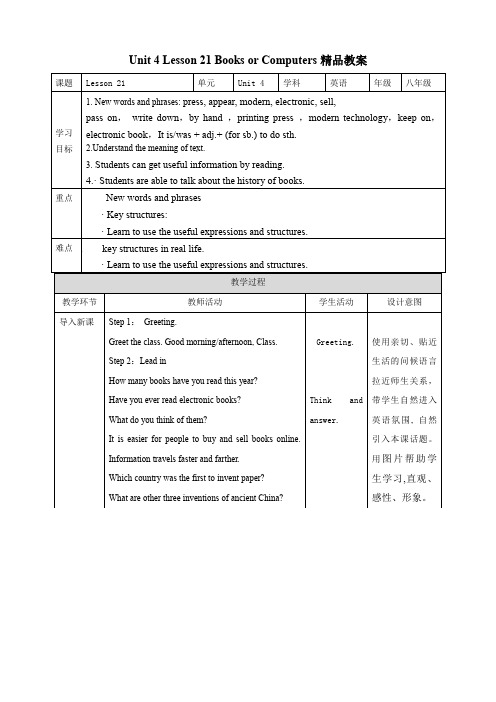
Read and give the correct order.
Listen,take notes and exercise.
Read,think and complete thesentences.
学生通过阅读课文,了解文章大意.
通过图片创设语境,帮助学生学习单词,理解课文。
学生通过阅读课文,梳理文章的写作脉络。
2. I saw him _____ the way home.
3. He is _______ the way to being a engineer.
4. ______ the way, what happened to the money?
5. Only ______ this way, we can improve ourselves.
2.Understand the meaning of text.
3.Students can get useful information byreading.
4.·Students are able totalk about the history of books.
重点
New wordsand phrases
—Yes. I don't think I should always ________ my parents since I've grown up.
- 1、下载文档前请自行甄别文档内容的完整性,平台不提供额外的编辑、内容补充、找答案等附加服务。
- 2、"仅部分预览"的文档,不可在线预览部分如存在完整性等问题,可反馈申请退款(可完整预览的文档不适用该条件!)。
- 3、如文档侵犯您的权益,请联系客服反馈,我们会尽快为您处理(人工客服工作时间:9:00-18:30)。
Unit 4 Why don’t you talk to your parents?Section A 1 (1a-2d)Step 1 Warming up1. 导入学生们平时在学校和生活中存在的问题。
T: What’s the matter/What’s wrong?S: He has too much homework to do.T: Do he like to do it?S1:No, he doesn’t. Because he doesn’t have any free time to do things he likes.…Step 2 Talking1. Look at these problems. Do you think they are serious or not? Ss discuss with their partners and give some advice.①I have to study too much so I don’t get enough sleep.② I have too much homewor k so I don’t have any free time to do things I like.③My parents don’t allow me to hang out with my friends.④ I have too many after-school classes.⑤ I got into a fight with my best friend.Step 3 Listening1. T: Tell Ss to read the sentences in 1a again. Make sure they know the meaning of thesentences.2. Play the recording for the Ss to listen and circle the problems you hear in 1a.3. Play the recording again. Check the answers with the Ss.Step 4 Pair work1. Let Ss read the conversation in the box.2. Use the information in 1a to make other conversations.3. Let some pairs act out their conversations.e.g. A: What’s wrong?B: I’m really tied because I studied until midnight last night.A: Why don’t you go to sleep earlier this evening?4. Language points1) allow v. 允许;准许allow sb. (not)to do sth. (不)允许某人做某事e.g. My parents don’t allow me to stay up late. 我父母不允许我熬夜。
Mr. Smith allowed Mike to drive there. 史密斯先生允许迈克开车去那里。
2) wrong adj.错误的;不对的= not righte.g. Some words on the advertisement are wrong. 广告上的一些字错了。
Step 5 ListeningWork on 2a:T: Peter has some problems. What advice does his friend give him? Fill in the blanks with could or should.1. Let Ss read the sentences in 2a.2. Play the recording for the Ss to listen and write the words in the blank.3. Play the recording again to check the answers.Work on 2b:1. Let Ss read the sentences below. Explain some main sentences for the Ss. Make sure they know the meaning of each sentence.2. Play the recording for the Ss to write the letters (a-e) next to the advice in 2a.3. Play the recording again to check the answers.Answers: 1. d 2. e 3. a 4. c 5. bExercise:Listen again. Fill in the blanks.Boy 2 had a ______ with his best fr iend. He could ______ him a letter. But he isn’t good at writing letters. He ______ call him ____, but he doesn’t want to talk about it on the ______. He ______ talk to him so that he can say he’s sorry but it’s not ____. He ______go to his house but he do esn’t want to _______ him. He could take him to the _____________, but he doesn’t want to wait that long.Step 6 Pair work1. Tell Ss to make a conversation using the information in 2a and 2b.2. Let one pair to read out their conversation first.3. e.g. A: What’s the matter, Peter?B: I had a fight with my best friend. What should I do?A: Well, you should call him so that you can say you’re sorry.B: But I don’t want to talk about it on the phone.4. Ss act the conversation in pairs. Ask some pairs to act out their conversations.Step 7 Role-play1. Ss read the conversations and try to understand the meaning.2. Read the conversation after the teacher.3. Practice the conversation with their partner. Then let some pairs to act out theconversation.4. Explain some new words and main points in the conversation.(1) guesse.g. Let us guess the height of the building. 让我们来猜一下这个建筑物的高度。
(2) big deal, dealbig deal是英语中的一个固定搭配,表示“重要的事情或状况”,多用于非正式交流。
作否定用法时,常说It’s not a bi g deal或It’s no big deal.表示说话人并不认为某事有什么了不起。
e.g. There's a soccer game on TV this evening but I don’t have to watch it. It’sno big deal. 今天晚上电视上有一场足球赛,但我不一定要看。
没什么大不了的。
It’s a big deal, David, bigger than you know.这事挺重要的,戴维,比你所知道的要重要。
What's the big deal? It’s only a birthday, not the end of the world.有什么了不起的?这不过是个生日,又不是世界某日。
(3) work outwork out 解决(问题);算出e.g. Mike worked out the difficult problem by himself.迈克自己算出了那道难题。
Is it possible to work out the problem? 有可能解决这个问题吗?Homework:Write three conversations about your problems and your friends’ suggestions.What could I do?B: You could …Section A 2 (3a-3c)一、教学目标:1. 语言知识目标:1) 学习掌握下列词汇:get on with; relation, communication, argue, cloud, elder, instead, whatever, nervous, offer, proper, secondly, communication, explain, clear2)阅读短文,能按要求找到相应的信息。
3)通过阅读提高学生们的阅读能力。
4) 了解在如果生活中发生了一些不尽如人意的问题,应当如何面对理性地去解决。
2. 情感态度价值观目标:人的一生并不都是一帆风顺的,难免有一些挫折的困难,如果生活中发生了一些不尽如人意的问题,我们学会冷静对待,学会合理的办法去理性地去解决。
二、教学重难点1. 教学重点:1) 掌握本部分出现的生词和词组,达到熟练运用的目标。
2) 阅读短文,获得相关的信息。
通过阅读练习,来提高阅读能力。
2. 教学难点:1) 阅读短文,获得相关的信息的能力。
